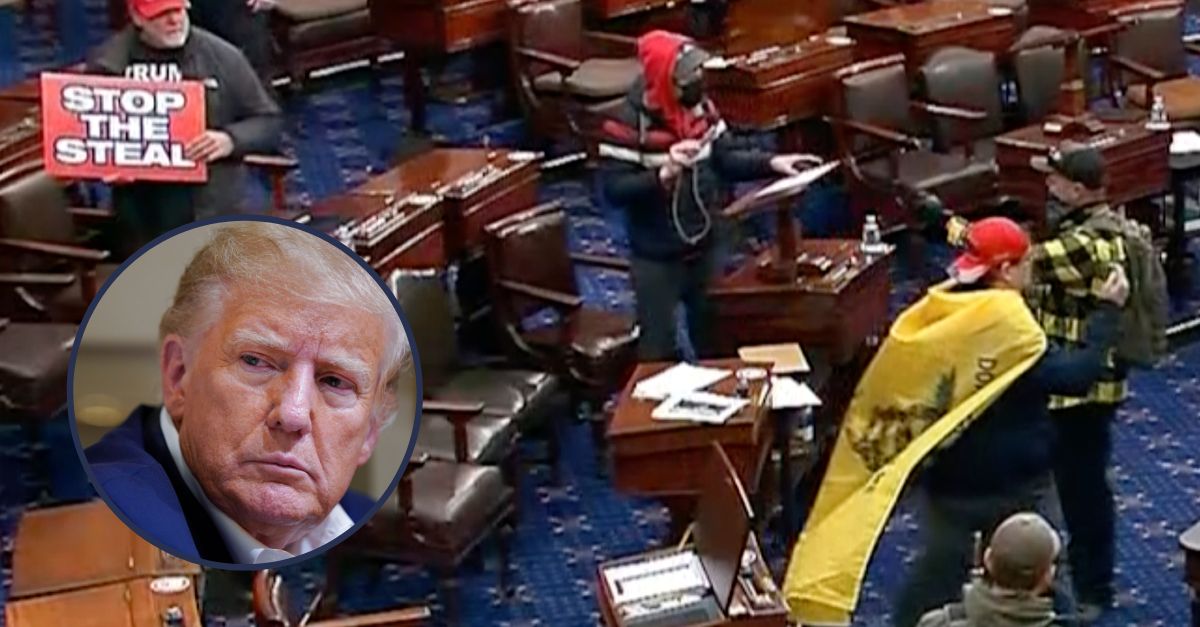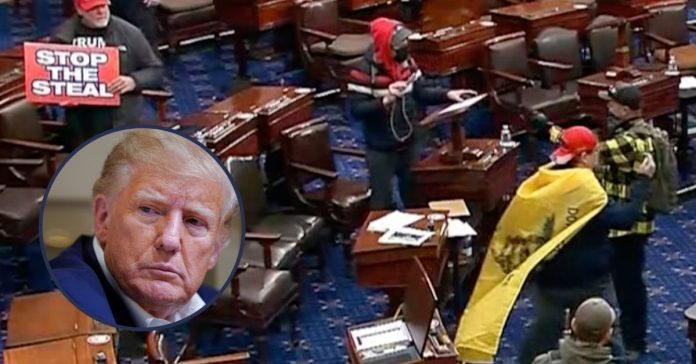
Background: This image is from the Senate floor on Jan. 6, 2021. (Senate Television via AP). Inset: Former President Donald Trump listens as he speaks with reporters while in flight on his plane after a campaign rally at Waco Regional Airport, in Waco, Texas, March 25, 2023, while en route to West Palm Beach, Fla. (AP Photo/Evan Vucci, File)
When Donald Trump goes on trial next year for his alleged criminal conspiracy to overturn the 2020 election, special counsel prosecutors want to ban him from invoking any defense laden in conspiracy theories about the Jan. 6 attack on the U.S. Capitol and if not, they note, they may be forced to call Trump’s bluff and — among other things — show “that people whom the defendant alleges were undercover actors actually were his vehement supporters.”
The conspiracy theory that the Capitol attack was the responsibility of undercover FBI agents, leftists and members of “antifa” has long been debunked in the fallout of Jan. 6, 2021.
Nonetheless, these theories have remained a mainstay of Trump’s defense when he discusses his indictment in Washington, D.C., publicly and it is also a false theory invoked regularly by his allies including far-right lawmakers in the U.S. House and Senate.
But when it comes to what will happen inside the courtroom, prosecutors urged in the 20-page motion that Trump simply cannot be permitted to confuse the jury with his injections of “partisan political attacks and irrelevant and prejudicial issues” to his case, special counsel prosecutor Molly Gaston wrote.
Trump must be forced to stick to the relevant evidence and whether it has a bearing on his guilt or innocence not his takes on the credibility of the investigation or what he thinks the ultimate consequence or effect of taking him to trial will be on the nation, prosecutors argued.
His claims of “selective and vindictive prosecution” have nothing to do with the indictment against him in Washington, D.C., Gaston wrote, noting Trump’s “baseless claim” that President Joe Biden directed the charges against him to “interfere” with Trump’s run for the White House in 2024.
“In addition to being wrong, these allegations are irrelevant to the jury’s determination of the defendant’s guilt or innocence [and] would be prejudicial if presented to the jury, and must be excluded,” Gaston wrote.
A “selective prosecution claim” is not a defense on the merits of the charges against him, she added.
Trump is charged with conspiracy to defraud the United States by making repeated false claims that the 2020 election was stolen while knowing it was not and attempting to discount legitimate votes all the same to overturn the results.
He is also charged with a single count of conspiracy to obstruct an official proceeding, and one count of obstruction and attempt to obstruct an official proceeding, as well as one count of conspiracy against rights. The last charge refers to his alleged attempt to oppress, threaten and intimidate people in their right to vote in an election.
Trump’s case in Washington, D.C., is currently on hold as he fights to get the case dismissed, invoking arguments of immunity that have so far left judges unconvinced. Prosecutors acknowledged this Wednesday but also noted that should there be a “prompt resumption of the pretrial schedule,” to ensure no time is wasted on behalf of the government.
Trump has challenged his indictment as a violation of his First Amendment rights as well as vindictive prosecution.
None of this should be permitted in court when he is defending himself against the evidence, prosecutors argue.
“Evidence or argument that serves only to support a jury nullification argument has no relevance to guilt or innocence and must be excluded,” Gaston wrote, adding that while Trump’s attacks may be appropriate for the campaign trail, it is not the case for trial.
Trump’s attempts to “impeach” the criminal probe into his conduct are irrelevant and improper to argue before a jury because it is just the same “vindictive prosecution claim by another name,” Gaston said.
Claims by Trump that the indictment poses a great threat to the fabric of the country, his professional future, or even the future of his family and their livelihoods are improper appeals to the jury too and should be kept out, prosecutors said.
Trump has also already signaled to prosecutors that he intends to blame the events of Jan. 6 on the Capitol Police, National Guard, and D.C. Mayor Muriel Bowser.
Not only is this strategy false on its face, but it is also barred by existing rules of evidence, according to the special counsel’s office.
Any “alleged shortcoming” by law enforcement still does not absolve Trump, the motion argues.
“Settled caselaw makes clear that law officer inaction — whatever the reason for the inaction — cannot sanction unlawful conduct,” Gaston wrote.
Prosecutors say they are also aware that Trump appears “poised” to blame the events of Jan. 6 on “undercover agents, government informants or confidential human resources for the violence at the Capitol on Jan. 6” and he has promoted articles online and in evidence suggesting as much.
“Information on this topic is irrelevant to any charge or valid defense and allowing it would only confuse the jury and waste time on a collateral issue. The court should exclude it,” Gaston wrote.
In other cases where criminal Jan. 6 defendants have attempted to invoke this same argument, they have been unable to show that any undercover actor influenced a defendant’s actions or mental state.
“There is certainly no evidence that the defendant here had contact with or knew of any undercover actor anywhere on Jan. 6 and certainly not at the Capitol where the defendant promised his supporters he would join them. No such actor therefore could have affected or did affect his conduct or state of mind,” Gaston wrote. “If instead the defendant seeks to blame undercover actors for causing rioters to perpetrate violence and obstruct the certification proceeding, that argument is inadmissible for the same reasons as the defendant’s efforts to blame others, including law enforcement… or foreign influence [campaigns].”
If Trump wants to push the issue and force a discussion at trial over informant identities or intent, prosecutors will call his bluff, the motion explains.
“For example, it may require the government to introduce evidence to show that the people whom the defendant alleges were undercover actors actually were his vehement supporters.”
Any other arguments about so-called “foreign influence” on the outcome, like those claims that inflamed his base in 2020, are not considered evidence because evidence of third-party guilt is too speculative, prosecutors said.
Discussions of revisions made to the Electoral Count Act in the wake of Jan. 6 are also off the table
And lastly, while Trump is welcome to testify at trial and cross-examine witnesses, prosecutors want the judge to bar him from eliciting testimony about his state of mind, or his beliefs.
That is something only Trump can speak to, they say.
By proposing this, prosecutors are preemptively attempting to short-circuit what has long been expected to emerge from witnesses for Trump at his trial: they will testify he genuinely believed the 2020 election was stolen.
This should be inadmissible, prosecutors say.
It will likely be many weeks if not months before a ruling is reached on this matter given the appeals in play.
Have a tip we should know? [email protected]

